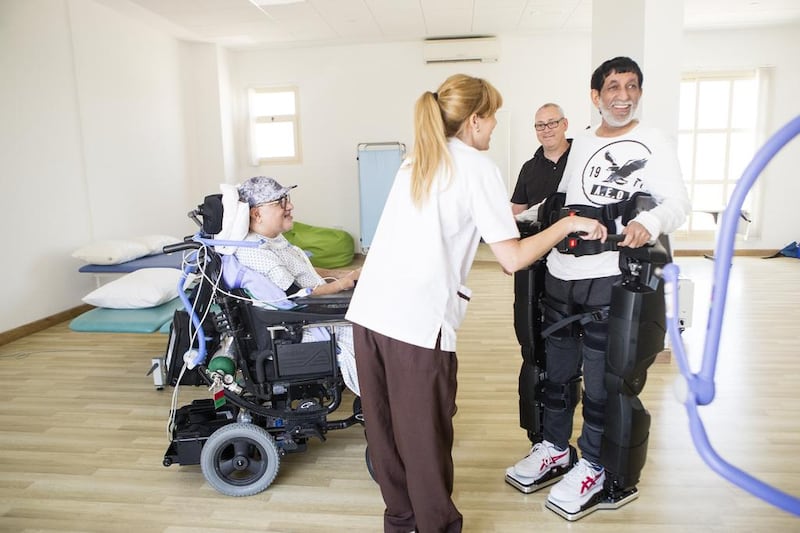ABU DHABI // When an operation to remove a spinal tumour five years ago left Ali Al Mehrezi paralysed from the neck down, he never thought he would walk again.
But thanks to Rex, the Robotic Exoskeleton – a pair of robotic legs that supports and assists a person who usually uses a wheelchair – the Emirati was able this week to take his first steps in years.
“It feels great,” said the 58-year-old, who beamed a smile as he gingerly put one foot in front of the other while making his way across a room at Amana Healthcare in Khalifa City. “Really good.”
Amana Healthcare is the first facility in the Middle East to purchase Rex, which it introduced this week. The exoskeleton – which lets users stand, walk and go up and down steps – cost about Dh500,000, and is making a huge impact at the long-term care and rehabilitation facility.
As a former agricultural engineer, Mr Al Mehrezi said he missed being on his hands and knees, working with plants and walking with the animals on his ranch.
As he was helped out of the exoskeleton, strapped tightly to the legs and around the waist, Mr Al Mehrezi said he was looking forward to his next session.
Being able to take steps on his own with the Rex machine has given him a renewed sense of purpose.
“I hope to have many, many sessions,” said Mr Al Mehrezi. “It gave me hope.”
The father of 12 sent a video of himself walking for the first time to his family living in Al Ain, and received an emotional response.
“They were very happy,” said Mr Al Mehrezi, who joked that he had a specific purpose for wanting to walk again.
“I want to walk again, because I want to get married again,” he laughed.
Khamis Aleqbaali was another patient who took his first steps after a medical tragedy changed his life.
In March, at just 22 years of age, the Emirati suffered a stroke, which affected his speech and left him confined to a wheelchair.
He said he found it easy to manoeuvre the bionic legs on his own and managed to control the speed and direction of his movements using a joystick and control pad.
“It was like being a robot for a while,” he said. “I walked 10 steps, and to the left and to the right.”
Mr Aleqbaali, who said he was looking forward to regular sessions with Rex, sent a video to his five brothers and two sisters that showed him walking with the bionic suit, which supports the body in an upright position, -allowing him to walk forwards and backwards and shuffle from side to side.
“They cried,” he said. “Well, the ladies did.”
Abdulrahman Ali Yousef, 53, who suffered a stroke in March that left him with speech and walking impairments, was also benefiting from Rex.
“I had a stroke on March 15 and I first I couldn’t speak or move,” he said.
While the Emirati has regained his speech and managed to gain some mobility, he could not walk unassisted. Rex allowed him to do just that.
“I feel so happy,” he said.
Debra Leeves, vice president of international sales and marketing at Rex Bionics – the New Zealand biotechnology com-pany that invented Rex – came with a team to Amana Healthcare to train the centre’s physiotherapists and patients on how to use the exoskeleton. They were moved to tears when they saw the Emiratis realise their dreams of walking again.
For patients like Mr Al Mehrezi, who cannot use other devices that required upper-body strength, the suit was life-changing.
Rex, said Ms Leeves, had many mental health benefits, such as allowing users to talk to people at eye level or do simple things like standing up to cook or shave, giving them back their independence.
It also has numerous physical health benefits, even after only 20 minutes of “Rexercise” – boosting patients’ blood circulation, reducing pressure sores, filling their lungs with air because of better posture, improving the condition of their muscles and bones, and even helping them to sleep better at night.
“If you sit down everything slows down, so if you sit like that for a long time, your bowels stop working, your bladder stops working, your lungs never actually fully expand, you get muscle wastage,” she said.
“If you stand up for just 20 minutes a day and move around, you are less likely to get all those secondary complications.
“Plus, if you see the smile on these patients’ faces, it just gives an enormous amount of quality of life back.”
newsdesk@thenational.ae





